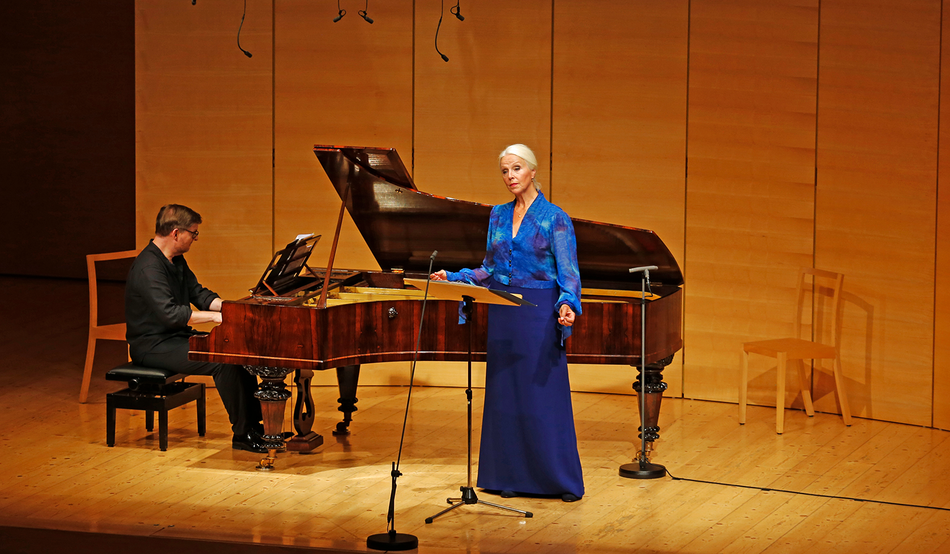To understand what the Schubertiade involves try to imagine London’s Wigmore Hall uprooted from the bustling streets of Marylebone and planted on the edge of a meadow on, say, the Isle of Skye. Or fantasise about walking out of the Barbican Hall into the foothills of Snowdonia.
In the evenings there will be world-class chamber music. And by day? Well, it’s obvious: you strap on your hiking boots and head out into the wild. If you had to sum up the Schubertiade experience in two words, they would be: music and mountains. If, perhaps, you had three: music, mountains and muesli.
The concerts take place in the hamlet of Schwarzenburg, in the heart-catchingly beautiful Bregenzerwald region of Austria. This year, we travelled by train to Zurich and hired a car for the last leg of the journey through fields, valleys, mountains and picturesque villages.
Here’s a sample day. Breakfast at the Schiff Hotel in Hittisau. Did I mention the unbelievable muesli? We drive out of the village and up the Hochhäderich mountain for a three-and-a-half-hour hike around the top, through woods and meadows, past tiny chapels and bell-clanking cows enjoying the last of the summer’s grass. We end up in a small mountain-hut café and tuck into a delicate salad washed down with Egger beer, made barely 10 miles away.
In the evening, the festival bus arrives at eight minutes past seven on the dot and by 8pm we’re waiting expectantly for that evening’s concert, with the Swedish mezzo Anne Sofie von Otter and the Australian pianist Kristian Bezuidenhout. It is an intriguing programme in several ways, having been billed as Winterreise and then changed to Schubert’s late quasi-cycle Schwanengesang.
The songs are interspersed with three solo piano pieces. And a glance at the stage in the honey-coloured wood hall that is now the main home of the Schubertiade tells us that Bezuidenhout has eschewed the festival’s concert Steinway for a fortepiano—a sentence will either make your heart sink or soar.
The instrument turns out to be a Dresden-made Rönisch from around 1861. The make is said to be well-known in Australia, which may explain why it is here tonight. I’m not convinced it did Bezuidenhout any favours.
In choosing Schwanengesang, von Otter was probably not signalling something of a swansong of her own. At 69, she has a full programme of engagements ahead. But there was something autumnal about this performance, containing herself in lower registers for the songs full of darkness and menace; exquisite in the more lyrical numbers. Her “Ständchen” and “Der Dopplegänger” will linger long in the memory.
The pattern of days repeated itself. On the Tuesday, a scrambling hike over rocks and down steep paths from the top of the mountain at Bezau for a lunch at the Alpe Greußings Wildmoos, during which the family’s goats mingle with walkers—the cheese here is milked and made on the premises.
That evening, the France-based Modigliani Quartet played Turina, Ravel and Schubert. The following day, a hike past lakes and through buttercup meadows near Lecknertal before the Modigliani play again: some Hugo Wolf, an early Beethoven quartet and the great Schubert Quintet D956 with the second cello played by Clemens Hagen.
A hike past lakes and through buttercup meadows before the Modigliani Quartet play again...
The first thing to be said about this quartet is that the local audience adores them, dragging them back on stage for repeated foot-stamping curtain calls. It’s easy to see why: they make a simply beautiful sound, they are engrossingly empathetic to each other and not a hair is out of place.
Is it churlish to want something more? The Ravel quartet opened with a sound as sweet as honey; you feel as if you have stepped into a warm bath of syrupy gentleness. Nothing is overdone; harmonic changes elide seamlessly without any signalling or—shudder—rubato. There is less a sense of instruments talking with each other; more a sense of a perfectly attuned whole.
It took the cellist Hagen’s arrival in the quintet to shake things up a bit, with his more demonstrative style of musicianship injecting some edge and energy. A quartet that feels at its most natural playing comfortably within themselves suddenly felt liberated to perform.
The Turina piece the previous evening was, while resolutely tonal, a 20th-century composition, which makes it something of a rarity for the festival. The artistic director, Gerd Nachbauer, has been in charge for more than 40 years, and the formula is unlikely to change.
But the upside is to sit with an audience discerning enough to relish programmes that are, in their own way, quite risky. Where else, for instance, would you hear so many of the 600-odd songs Schubert wrote? Marc Chagall was said to have been the inspiration for the idea of the festival, telling its founder, Hermann Prey: “Beethoven and Mozart are geniuses, but Schubert—Schubert is a miracle.”
So, in its own way, is this festival of music and mountains. If you’re thinking of joining the pilgrimage, contact the Bregenzerwald tourist office, which can guide you to the villages linked by the festival bus. In Schwarzenburg itself there are two good hotels, but many concertgoers stay further afield for better access to the hiking. In Hittisau, where we stayed, there are the Schiff and Krone hotels, both family-owned for generations and both offering an intriguing mix of traditional and modern.
Only the very tone-deaf pluck up the courage to inquire about the secret of the muesli, which has a mellow succulence that really merits a five-star review of its own. I try: the hotel owner, Antonie Metzler, smiles and deftly changes the subject. The music and the mountains may have their secrets—but so too, in transpires, does the muesli.













